NOTE: This review was published in September, 2014 by the Evangelical Review of Theology and Politics, a London-based international peer-reviewed journal exploring Evangelical issues from an interdisciplinary perspective. It is posted here with their express permission, and our thanks.
Introduction
C.S. Lewis: Revelation and the Christ, by Dr. Paul H. Brazier is comprised of four volumes and an annotated bibliography. I intend in this brief review to provide sufficient information for prospective readers to make an informed decision regarding the merit of the series.
C.S. Lewis: Revelation and the Christ |
|
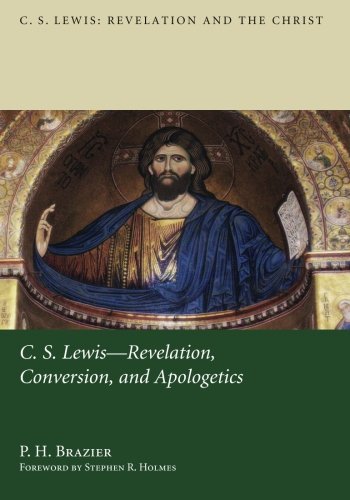 |
P.H. Brazier, C.S. Lewis—Revelation, Conversion and Apologetics, Series: C.S. Lewis: Revelation and the Christ, Book 1, (Eugene, OR: Pickwick Publications, Wipf and Stock, 2012). Print and Kindle/e-Book editions. ISBN 13: 978-1-61097-718-0. $35.00 (paperback). |
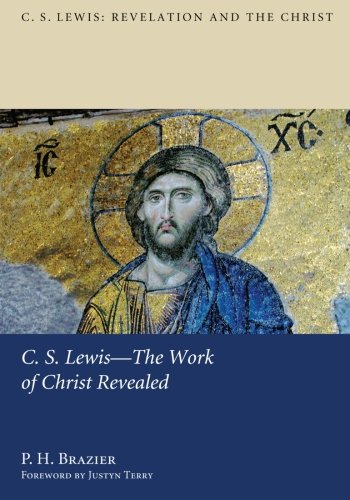 |
P.H. Brazier, C.S. Lewis—The Work of Christ Revealed, Series: C.S. Lewis: Revelation and the Christ, Book 2, (Eugene, OR: Pickwick Publications, Wipf and Stock, 2012). Print and Kindle/e-Book editions. ISBN 13: 978-1-61097-719-7. $23.00 (paperback). |
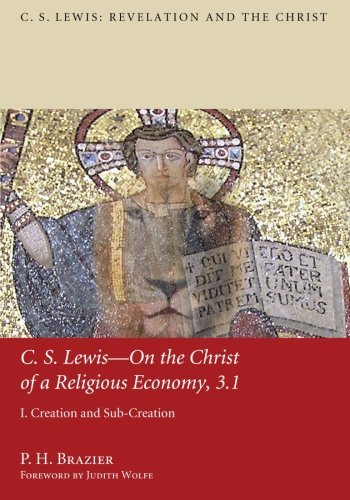 |
P.H. Brazier, C.S. Lewis—On the Christ of a Religious Economy. I. Creation and Sub-Creation. Series: C.S. Lewis: Revelation and the Christ, Book 3.1, (Eugene, OR: Pickwick Publications, Wipf and Stock, 2013). Print and Kindle/e-Book editions. ISBN 13: 978-1-61097-720-3. $35.00 (paperback). $35.00 (paperback). |
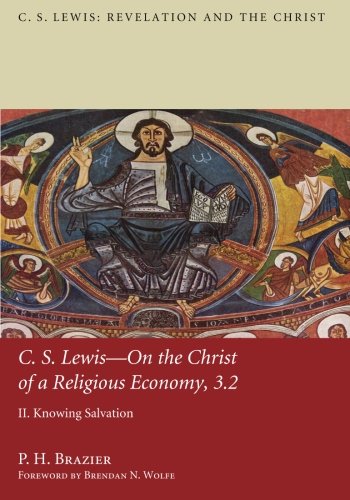 |
P.H. Brazier, C.S. Lewis—On the Christ of a Religious Economy. II. Knowing Salvation. Series: C.S. Lewis: Revelation and the Christ, Book 3.2, (Eugene, OR: Pickwick Publications, Wipf and Stock, 2014). Print and Kindle/e-Book editions. ISBN 13: 978-1-62032-982-5. $38.00 (paperback). |
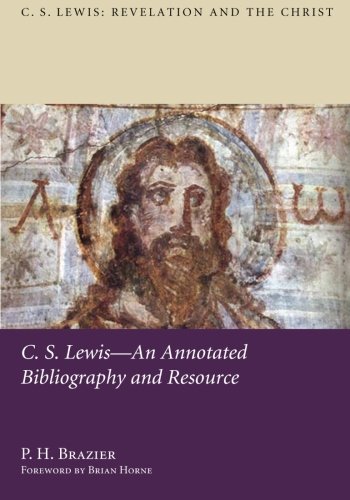 |
P.H. Brazier, C.S. Lewis—An Annotated Bibliography and Resource, Series: C.S. Lewis: Revelation and the Christ, Book 4, (Eugene, OR: Pickwick Publications, Wipf and Stock, 2012). Print edition only. ISBN 13: 978-1-61097-906-1. $35.00 (paperback). |
About The Author of This Collection

Dr. Paul Brazier is an independent theologian and scholar living in London. His knowledge of C.S. Lewis seems to be rather prodigious. This is coupled with a solid understanding of systematic theology. Together these two factors enable Dr. Brazier to reveal meaningful insights into Lewis’s theology across all his writings. Although Lewis never did produce a comprehensive systematic theology, the author organizes Lewis’ thought in a structured way. He provides what Lewis never did: a systematic theology of Lewis’ Christian beliefs.
Dr. Brazier has exemplary credentials for this monumental task. He holds multiple degrees, including a B.A in Fine Art, an M.Phil in Education, and an M.A. and Ph.D in Systematic Theology. His academic training is evident throughout—systematic theology shows up in his “content,†education in his “process.†In addition, Dr. Brazier is well-positioned in the world of C.S. Lewis. He is a long-time associate of The University of Oxford C.S Lewis Society and serves as design editor for the recently launched Journal of Inklings Studies. This biannual journal provides a forum for rigorous academic engagement with the thought of Oxford’s revered “Inklings,†including: C.S. Lewis, J.R.R. Tolkien, Charles Williams, Owen Barfield and their intellectual and literary peers and forebears, such as G.K. Chesterton and George MacDonald. Thus, the author is connected to vast network of academics who share his passion for C.S. Lewis.
It is difficult to imagine the effort required to produce such a work of erudition. We who read his output and put it to good use owe him a great debt. There may be authors wiser in interpreting the theology of C.S. Lewis, but I have not met them.
What the Reviewer Expected
As I undertook the task of reading approximately 1,300 pages my hope was to gain a deeper understanding of Lewis’s theology. To that end, my knowledge of Lewis’s spiritually formative experiences and his specific theological positions was greatly enhanced by these books. Although I was already aware of a most of what Lewis had to say about theology, the rich context and logical framework that Paul Brazier provided took what were mere puzzle pieces of knowledge and assembled them into an image of the great man’s theological thought.
Lewis’s great friend, Owen Barfield, once commented on the “organic†nature of Lewis’s writings across all genres. Barfield said: “Somehow what Lewis thought about everything was secretly present in what he said about anything.†I witness this phenomenon every time I re-read an essay or one of Lewis’s books. Still, Paul Brazier’s systematic approach has opened my eyes to new linkages across books, new variations on essential Lewis themes, and new evidence of the consistent body of thought that cuts across all of C.S. Lewis’s writings. Prior knowledge has been crystalized as a result of reading these books.
There was one un-anticipated benefit from reading this seminal work. I learned a great deal, not just about Lewis’ theology, but about theology broadly. I am no trained theologian; however, after my first pass through Brazier’s works I now know considerably more about both systematic theology and Christian history than before. This was a most pleasant bonus. Did Paul Brazier meet this reviewer’s expectations? Absolutely, and so much more.
On Lewis the Theologian
There are many experts, clergy and academics alike, who have come to believe that Lewis was a mere amateur theologian. Those who deny Lewis’ credentials include such dubious witnesses as A.N. Wilson and John Beversluis, and Ayn Rand seems rather unhinged in her diatribe.
Naturally, Lewis’ fellow Oxford dons thought him out-of-court writing books on Christianity, and many contemporary Anglican clerics deemed him their inferior. Still, such credible experts such as David F. Ford, Rachel Muers, and Colin E. Gunton overlook him. Even N.T. Wright seems cautious in his assessment, referring to him instead as an “apologist.†Naysayers willingly grant that he was an effective advocate of the core principles of the Christian faith so well expressed in the vernacular of the common man. But they discount his credentials as a theologian. After all, despite Lewis’ exceedingly rare “triple Firsts†at Oxford, his course of study included the classics, philosophy and English literature, not theology. For this reason alone some dismiss Lewis as a serious theologian.
I think they are wrong. It is true that in his day Lewis would have been considered an “amateur,†however this label would not be the result of limited knowledge or substandard output, but rather by the fact that he did not do this sort of work for a living. Indeed, in theology, Lewis was self-taught, but his prodigious reading coupled with his incomparable mind produced extraordinary expertise.
Paul Brazier builds a compelling case that C.S. Lewis was a first rate theologian. I have heard arguments on both sides over the years, but Brazier’s case is convincing. Despite the fact that Lewis did not produce a systematic theology, the author demonstrates that Lewis’ theology is original, comprehensive, systematic and orthodox. Brazier’s approach is not so much to dismantle opposing views, but to delve into Lewis’ theology at sufficient depth to clearly demonstrate its theological profundity. He notes that Lewis made unique contributions to the field of theology (e.g., his “Argument from Desire,†and his lesser-known theory of revelation, “Transpositionâ€). In my opinion, this series of book thoroughly lays to rest any notion that C.S. Lewis was a mere “amateur†as a theologian.
Who Should Read This Series?
This resource is not for everyone. These are lengthy, scholarly works. So, who should find value in this resource? I imagine there are four categories of prospective readers. First, there is the “casual†Christian reader who enjoys quick reads that inspire spirituality. If the reader is looking for a short and entertaining piece on the life and writings of C.S. Lewis, I advise that reader to look elsewhere. Casual readers will find many worthy companion books to help “unpack†Lewis’ thought. But, I suspect 1,300 pages will exceed their curiosity. There are many concise books for this sort of reader, but this is not among them.
Second, there is the “apologetics†reader who seeks to enhance his or her familiarity with basic arguments for the defence of the faith. Here again, there are other fine books specifically designed for that purpose. While there is much here that is useful for apologetics purposes, these books would not be the first direction I would point such readers.
Third, there is the “neophyte Lewis aficionado†who is drawn to The Chronicles of Narnia, The Screwtape Letters, and possibly even Mere Christianity or The Great Divorce. This reader will find much of interest here, but the sheer volume of information may exceed such a reader’s appetite. For those who seek a deeper understanding of Lewis’ theological symbolism in The Chronicles of Narnia, there are many fine resources available for that purpose. I would not dissuade Lewis neophytes from venturing into this series, for it will certainly whet their appetite to know more about this great man. However, there are other books better-suited to this reader’s stage in the Lewis journey.
Forth, there is the “serious†student and/or instructor of the life and writings of C.S. Lewis. This sort of reader will find this series of books to be an absolutely indispensable resource. I heartily recommend that every such reader—especially those in academia who teach about C.S. Lewis—should purchase, read, use, and enjoy this incomparable resource. There is no more valuable resource that I have yet found.
Key Topics Addressed
To expect a reviewer to summarize such a comprehensive work as this is not unlike expecting him to summarize The Encyclopaedia Brittanica. Paul Brazier’s work is simply too large, too comprehensive to do this. I shall leave all that for the reader. (Note: there is a section at the end of this review taken from the author’s website that describes the systematic flow of the series.) My purpose is to verify the worth of the book, not to distil it.
So, what does this series of book address? The author covers, in significant detail, the broad spectrum of Lewis’ theological thought across all Lewis’ writings. If he has left anything out, I cannot identify it.
The following is by no means an exhaustive list, but is intended to provide the reader some sense of what Paul Brazier covers, including:
- Lewis’ thoughts on The Trinity.
- Lewis’ innovative (and popular) argument for belief, the Trilemma.
- Lewis’ commitment to Patristic orthodoxy as a basis for his theology.
- Lewis position on church Doctrines including Original Sin, Total Depravity and Hell.
- Lewis’ views on soteriology, including Election and Predestination.
- Lewis’ affinity with Arminianism versus Calvinism.
- Lewis’ theory of “Christological prefigurement†(the True Myth).
- Lewis’ profound theory of revelation, known as “Transposition.â€
- Lewis’ precise delineation of what constitutes “Mere Christianity.â€
Author Brazier pulls all this together in a framework that illuminates the consistency of Lewis’ thought across diverse literary genres. He delves deeply into such works as Mere Christianity, The Problem of Pain, The Great Divorce, The Screwtape Letters and The Chronicles of Narnia. He tracks the evolution of Lewis’ thought over time. There is no more useful resource anywhere, other than Lewis’ great works themselves.
Moreover, Paul Brazier covers many other related topics, such as:
- Lewis’ philosophical influences (e.g., Plato, Aristotle, Boethius, George Berkeley and Henry More).
- Lewis’ theological influences (St. Paul, Justin Martyr, Vincentius, Augustine, Aquinas, Richard Hooker and Richard Baxter).
- Lewis’ Platonism and its intersection with his Christian theology.
- Lewis’ systematic method in evangelism and apologetics.
- Lewis’ philosophical and theological evolution.
- Events that shaped his works (e.g., the Anscombe-Lewis debate).
The more important question is not what the author covers, but how well he covers it. Paul Brazier’s thoroughness has its rewards. As I read, there were new terms I had not before encountered. Whenever this happened, Brazier provided an adequate definition. At no point was I forced to consult a lexicon to “track†what he was saying. Better yet, when he wrote something that really tweaked my interest, at that very moment when I was thinking: “OK, Mr. Brazier, tell me more†he did precisely that in the ensuing paragraphs. As an educator, Paul Brazier demonstrates a keen awareness of the reader’s natural curiosity. He has a remarkable ability to provide the additional information the reader needs for his points to resonate fully.
This is a work of erudition. It is comprehensive and detailed. But, it is not concise. There were moments in the reading where I found myself wanting to move a bit faster. But that is the trade-off one makes for such erudition. Paul Brazier covers many topics in this book and brings in a many outside references. Not all were of interest to me. For example, Paul is very knowledgeable about the life and writings of Karl Barth, and he uses this expertise as a basis for benchmarking Lewis’ thought. If I were a student of Barth, I would find these insights compelling. But I am not, so the analogies had less meaning for me.
On rare occasion Brazier provided a level of detail that exceeded my curiosity. Here I must confess that I am no ardent advocate of The Chronicles of Narnia. I realize this is to my detriment, and I hope to correct this in time. But, while I “get†that Lewis’ theology has been “ported†to The Chronicles of Narnia (and The Cosmic Trilogy), I prefer to take my Lewis “straight up†in nonfiction form. Consequently, where Brazier reached deep into The Chronicles of Narnia to Illuminate Lewis’ specific thinking, I shifted into “scan mode.†This is not to say those who cherish The Chronicles of Narnia will not find much of great interest—I believe they will. Certainly, when Brazier went into The Great Divorce for illumination I paid rapt attention; even more so when he pointed to Mere Christianity or The Problem of Pain or The Weight of Glory. Although I did not take full advantage of them, his segues into The Chronicles of Narnia are entirely warranted and, I am sure, insightful.
Perhaps the most important question a reader will have is this: Is the content credible? This is a difficult question to answer, if only because much of the knowledge the author imparted was new to me. It is difficult to posit categorically that everything Paul Brazier says in this book is accurate and based upon scholarly research. I immersed myself in Brazier’s text with an open mind (as Lewis advises us) and a degree of trust. I was confident that my advance knowledge of C.S. Lewis would enable me to quickly red-flag any errors. But, in the final analysis, I found no such errors in any of these books.
More importantly, I contend that everything that I knew about C.S. Lewis prior to reading Brazier’s book held true in his text. This is not to say there were no new insights, for there were many. His analysis of the Anscombe-Lewis debate is a prime example. The author’s insights corresponded with my prior assessment of the situation, but he went much deeper, providing a new perspective on the impact of this debate on Lewis’ future writings. Other topics where Paul Brazier enlightened me the most include: (a) Lewis’ commitment to Patristic orthodoxy (b) Lewis’ apologetics method (c) Lewis’ concise delineation of what “Mere Christianity†really means and (d) Lewis’ theory of revelation, or “Transposition.â€
I have not met nor spoken with Paul Brazier, but I have exchanged a series of emails with him related to questions I had about Lewis. In every case, I have found Paul Brazier to be responsive and generous with his feedback. Every author should be so committed to his subject. How many authors create a companion website solely to support a book? Paul Brazier has done this. It reflects his commitment to excellence.
Reading C.S. Lewis: Revelation and the Christ has enhanced my knowledge of C.S. Lewis, and expanded my knowledge of theology and Christian history. That the author achieves all this at the same time is the true value of this book.
I say without reservation that this series of books, C.S. Lewis: Revelation and the Christ, is the single most valuable Lewis resource among the several hundred books “about†C.S. Lewis that I own. This is meaningful, for most books about Lewis are excellent and those by Peter Kreeft, James Como and Alister McGrath are exemplary. This is the most in-depth resource on C.S. Lewis that I have ever seen, with the exception of Walter Hooper’s C.S. Lewis Companion and Guide. When I need biographical detail on Lewis I will look to George Sayer, Alister McGrath and others. But when I want to go deep on Lewis’s theology—the realm of his most profound ideas—I will turn first to Paul Brazier. If there is a more useful book on Lewis, I have not found it.
To all serious students and teachers of C.S. Lewis: I encourage you to purchase this set, to read and reflect on its illuminating content and to enjoy its eminent readability. You will not be disappointed.
